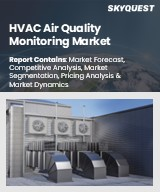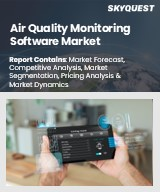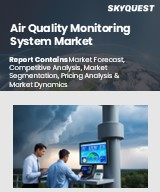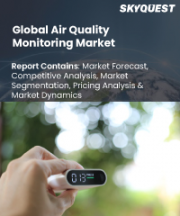
|
시장보고서
상품코드
1716397
공기질 모니터링 장비 시장 예측(-2032년) : 제품별, 샘플링 방법별, 장비 유형별, 오염물질별, 최종사용자별, 지역별 분석Air Quality Monitoring Equipment Market Forecasts to 2032 - Global Analysis By Product, Sampling Method, Equipment Type, Pollutant, End User and By Geography |
||||||
Stratistics MRC에 따르면, 세계 공기질 모니터링 장비 시장은 2025년 63억 달러 규모에 이르고, 예측 기간 동안 CAGR 9.5%로 성장하여 2032년에는 119억 달러에 달할 것으로 예측됩니다.
공기질 모니터링 장치는 일산화탄소, 이산화탄소, 이산화질소, 이산화황, 오존, 입자상 물질(PM2.5 및 PM10)과 같은 가스를 포함한 대기 중 오염물질을 감지하고 측정하는 데 사용되는 다양한 장치 및 장비를 말합니다. 이러한 시스템은 환경 규제 준수를 보장하고 공중 보건을 보호하기 위해 주변 공기의 질을 평가하는 데 도움이 됩니다. 실내외 대기 오염 수준을 모니터링하기 위해 정부 기관, 산업계, 연구 기관 등에서 널리 사용되고 있습니다.
실내 공기질(IAQ) 모니터링 솔루션 확장
주거용, 상업용, 산업용 건물에서 건강한 실내 환경 유지에 대한 관심이 높아지면서 IAQ 모니터링 시스템에 대한 수요가 증가하고 있으며, VOC, CO2, 미립자 물질과 같은 실내 오염물질이 건강에 미치는 영향에 대한 인식이 높아지면서 시장 성장에 영향을 미치고 있습니다. 기술의 발전으로 지속적인 공기 모니터링을 위한 보다 정확하고 컴팩트하며 사용자 친화적인 IAQ 장비가 가능해졌습니다. 또한, 스마트 홈 트렌드와 건물 자동화는 HVAC 및 보안 시스템에 IAQ 센서의 통합을 촉진하고 있습니다.
교정 및 데이터 정확도 문제
공기질 모니터링 시스템은 종종 센서의 드리프트와 정확도를 유지하기 위한 잦은 재교정의 필요성이라는 문제에 직면하게 됩니다. 저가형 센서는 가격이 저렴하지만, 다양한 환경 조건에서 일관성이 없거나 신뢰할 수 없는 데이터를 생성할 수 있습니다. 센서의 출력과 실제 오염물질 농도의 불일치는 규제나 조사에 사용되는 데이터의 신뢰성을 떨어뜨립니다. 이러한 한계는 운영 비용을 증가시키고, 특히 비용에 민감한 응용 분야에서 광범위한 시장 침투를 저해할 수 있습니다.
휴대용 웨어러블 모니터에 대한 수요 증가
개인의 건강과 안전에 대한 소비자의 관심이 높아지면서 소형 휴대용 공기질 모니터의 채택이 가속화되고 있습니다. 이러한 기기는 오염 물질 수준을 실시간으로 제공하여 개인이 주변 환경에 대한 정보에 입각한 판단을 내릴 수 있도록 도와줍니다. 도시에 거주하는 사람들, 특히 호흡기 질환을 앓고 있는 사람들은 개인용 공기 센서를 사용하여 일상적인 노출을 추적하고 있습니다. 또한, 여행자, 학생, 이동이 잦은 직장인들 수요로 인해 휴대용 솔루션의 소비자 기반이 확대되고 있습니다.
대체 기술
위성 기반 공기질 모니터링 플랫폼의 출현은 대규모 환경 모니터링을 위한 광범위하고 비용 효율적인 대안을 제공합니다. 위성 데이터의 접근성이 향상되고 정확도가 높아짐에 따라 고정식 또는 국지적 모니터링 스테이션에 대한 의존도가 낮아질 수 있습니다. 원격 감지 데이터를 환경 정책 수립에 통합하면 기존 장비에 대한 의존도를 낮출 수 있습니다. 이러한 기술적 선호도의 변화는 기존 대기 모니터링 장비 제조업체 시장 점유율에 도전이 될 수 있습니다.
코로나19의 영향:
코로나19 사태로 인해 실내 공기질의 중요성, 특히 혼잡한 공공시설과 의료 환경에서의 실내 공기질에 대한 관심이 높아졌습니다. 그러나 적절한 환기를 보장하고 바이러스 감염 위험을 줄이기 위해 실내 모니터링 시스템의 설치가 급증했습니다. 제조업체들은 새로운 작업장 및 건물 안전 표준에 적응하기 위해 IoT 기반 원격 공기 모니터링 솔루션에 중점을 두었습니다. 팬데믹은 또한 공기 정화 시스템에 대한 관심을 불러 일으켜 간접적으로 성능을 평가하기 위한 공기질 센서의 필요성이 높아졌습니다.
예측 기간 동안 실내 모니터 분야가 가장 클 것으로 예측됩니다.
실내 모니터링 분야는 오염 수준 증가와 실내에서 보내는 시간 증가로 인해 예측 기간 동안 가장 큰 시장 점유율을 차지할 것으로 예측됩니다. 도시화가 진행되고 건물 외벽이 엄격해짐에 따라 지속적인 실내 오염물질 추적의 필요성이 증가하고 있습니다. 규제 기관과 작업장 안전 기준은 인증된 실내 모니터링 솔루션의 채택을 촉진하고 있으며, IAQ에 대한 인식이 높아짐에 따라 제조업체들은 사용자 친화적이고 다기능적인 실내 모니터링 시스템에 초점을 맞추었습니다.
예측 기간 동안 액티브/연속 모니터링 분야가 가장 높은 CAGR을 나타낼 것으로 예측됩니다.
예측 기간 동안 능동형/연속형 모니터링 분야는 사무실, 학교, 병원, 교통 요충지에서 수요로 인해 가장 높은 성장률을 나타낼 것으로 예측됩니다. 실내 공기질 모니터링은 부가가치 기능으로 고급 부동산 및 숙박업 분야에서도 인기를 끌고 있습니다. 정부 주도의 그린빌딩 이니셔티브와 LEED와 같은 인증은 IAQ 투자를 더욱 촉진하고 있습니다. 무선 연결 및 클라우드 기반 데이터 분석과 같은 기술적 개선으로 실내 시스템은 더 쉽게 사용할 수 있고 확장할 수 있게 되었습니다.
가장 큰 점유율을 차지하는 지역:
예측 기간 동안 아시아태평양은 실시간 데이터 및 동향 분석 기능을 제공하는 능력으로 인해 가장 큰 시장 점유율을 차지할 것으로 예측됩니다. 이러한 시스템은 대기 질이 빠르게 변화하는 산업, 도시, 의료 분야에서 특히 가치가 높습니다. 지속적인 시스템은 환경 규정 준수, 조기 경보 시스템, 작업 안전을 위해 채택되고 있으며, AI 기반 분석 도구와의 통합은 그 기능성과 시장 매력을 더욱 높여주고 있습니다.
CAGR이 가장 높은 지역:
예측 기간 동안 북미는 유해 가스 및 미립자에 대한 직업적 노출에 대한 우려가 증가함에 따라 가장 높은 CAGR을 보일 것으로 예측됩니다. 연속 측정 장비는 수동적인 대체 장비에 비해 보다 상세하고 장기적인 통찰력을 제공합니다. 정부 및 환경 기관은 또한 더 나은 오염 제어를 위해 상설 대기 모니터링 네트워크 설치에 자금을 지원하고 있습니다. 이러한 시스템이 제공하는 향상된 신뢰성과 데이터 투명성은 성장을 가능하게 하는 중요한 요소입니다.
무료 커스터마이징 서비스:
본 보고서를 구독하는 고객은 다음과 같은 무료 맞춤화 옵션 중 하나를 이용할 수 있습니다.
- 기업소개
- 추가 시장 기업 종합 프로파일링(최대 3개사까지)
- 주요 기업의 SWOT 분석(3개사까지)
- 지역 세분화
- 고객의 관심에 따른 주요 국가별 시장 추정, 예측, CAGR(주: 타당성 확인에 따라 다름)
- 경쟁사 벤치마킹
- 제품 포트폴리오, 지리적 입지, 전략적 제휴를 기반으로 한 주요 기업 벤치마킹
목차
제1장 주요 요약
제2장 서문
- 개요
- 이해관계자
- 조사 범위
- 조사 방법
- 데이터 마이닝
- 데이터 분석
- 데이터 검증
- 조사 접근
- 조사 자료
- 1차 조사 정보원
- 2차 조사 정보원
- 전제조건
제3장 시장 동향 분석
- 성장 촉진요인
- 성장 억제요인
- 기회
- 위협
- 제품 분석
- 최종사용자 분석
- 신흥 시장
- COVID-19의 영향
제4장 Porter의 Five Forces 분석
- 공급 기업의 교섭력
- 바이어의 교섭력
- 대체품의 위협
- 신규 진출업체의 위협
- 경쟁 기업간 경쟁 관계
제5장 세계의 공기질 모니터링 장비 시장 : 제품별
- 실내 모니터
- 고정식 실내 모니터
- 휴대용 실내 모니터
- 야외 모니터
- 휴대용 야외 모니터
- 고정식 야외 모니터
- 분진 및 입자상 물질 모니터
- AQM 스테이션
- 웨어러블 모니터
제6장 세계의 공기질 모니터링 장비 시장 : 샘플링 방법별
- 액티브/지속적 모니터링
- 수동 모니터링
- 패시브 모니터링
- 단속적 모니터링
- 스택 모니터링
제7장 세계의 공기질 모니터링 장비 시장 : 장비 유형별
- 가스 분석 장비
- 입자상 물질 모니터
- 기상 모니터링
- 공기 샘플러
- 기타 장비 유형
제8장 세계의 공기질 모니터링 장비 시장 : 오염물질별
- 화학 오염물질
- 질소 산화물
- 황 산화물
- 이산화탄소
- 휘발성 유기 화합물
- 기타 화학 오염물질
- 물리적 오염물질
- 생물학적 오염물질
- 기타 오염물질
제9장 세계의 공기질 모니터링 장비 시장 : 최종사용자별
- 정부기관·학술기관
- 상업 및 주택 사용자
- 석유화학 산업
- 발전소
- 제약 업계
- 스마트 시티 당국
- 기타 최종사용자
제10장 세계의 공기질 모니터링 장비 시장 : 지역별
- 북미
- 미국
- 캐나다
- 멕시코
- 유럽
- 독일
- 영국
- 이탈리아
- 프랑스
- 스페인
- 기타 유럽
- 아시아태평양
- 일본
- 중국
- 인도
- 호주
- 뉴질랜드
- 한국
- 기타 아시아태평양
- 남미
- 아르헨티나
- 브라질
- 칠레
- 기타 남미
- 중동 및 아프리카
- 사우디아라비아
- 아랍에미리트(UAE)
- 카타르
- 남아프리카공화국
- 기타 중동 및 아프리카
제11장 주요 발전
- 계약, 파트너십, 협업 및 합작투자(JV)
- 인수와 합병
- 신제품 발매
- 사업 확대
- 기타 주요 전략
제12장 기업 프로파일링
- 3M
- General Electric
- HORIBA Scientific
- Aeroqual
- Emerson Electric Co.
- Siemens
- Merck KGaA
- Teledyne Technologies Incorporated.
- Testo SE & Co. KGaA
- Thermo Fisher Scientific Inc.
- KUNAK TECHNOLOGIES SL
- Airthings
- Honeywell International Inc.
- CODEL International LTD
- Modcon Systems Ltd
According to Stratistics MRC, the Global Air Quality Monitoring Equipment Market is accounted for $6.3 billion in 2025 and is expected to reach $11.9 billion by 2032 growing at a CAGR of 9.5% during the forecast period. Air quality monitoring equipment refers to a range of devices and instruments used to detect and measure pollutants in the air, including gases like carbon monoxide, nitrogen dioxide, sulfur dioxide, ozone, and particulate matter (PM2.5 and PM10). These systems help assess ambient air quality, ensuring compliance with environmental regulations and safeguarding public health. They are widely used by government agencies, industries, and research institutions to monitor indoor and outdoor air pollution levels.
Market Dynamics:
Driver:
Expansion of indoor air quality (IAQ) monitoring solutions
The growing focus on maintaining healthy indoor environments in residential, commercial, and industrial buildings is driving demand for IAQ monitoring systems. Increased awareness of the health impacts of indoor pollutants such as VOCs, CO2, and particulate matter is influencing market growth. Technological advancements have enabled more accurate, compact, and user-friendly IAQ devices for continuous air monitoring. Additionally, smart home trends and building automation are promoting integration of IAQ sensors into HVAC and security systems.
Restraint:
Calibration and data accuracy issues
Air quality monitoring systems often face challenges related to sensor drift and the need for frequent recalibration to maintain accuracy. Low-cost sensors, while affordable, can produce inconsistent or unreliable data under varying environmental conditions. Discrepancies between sensor output and actual pollutant concentration reduce trust in data for regulatory and research use. These limitations increase the operational costs and hinder broader market penetration, especially in cost-sensitive applications.
Opportunity:
Rising demand for portable and wearable monitors
The increasing consumer interest in personal health and safety has accelerated the adoption of compact, portable air quality monitors. These devices provide real-time pollutant levels, empowering individuals to make informed decisions regarding their surroundings. Urban dwellers, especially those with respiratory conditions, are turning to personal air sensors for daily exposure tracking. Furthermore, demand from travelers, students, and mobile workers is expanding the consumer base for these portable solutions.
Threat:
Substitute technologies
The emergence of satellite-based air quality monitoring platforms offers a broad and cost-efficient alternative for large-scale environmental surveillance. As satellite data becomes more accessible and accurate, reliance on fixed or localized monitoring stations may decline. Integration of remote sensing data into environmental policymaking may reduce the dependency on traditional equipment. This shift in technological preference can challenge the market share of conventional air monitoring device manufacturers.
Covid-19 Impact:
The COVID-19 pandemic brought increased attention to the importance of indoor air quality, especially in crowded public and healthcare settings. However, there was a surge in installations of indoor monitoring systems to ensure proper ventilation and reduce virus transmission risk. Manufacturers shifted focus toward remote, IoT-enabled air monitoring solutions to adapt to new workplace and building safety standards. The pandemic also sparked interest in air purification systems, indirectly boosting the need for air quality sensors to evaluate performance.
The indoor monitors segment is expected to be the largest during the forecast period
The indoor monitors segment is expected to account for the largest market share during the forecast period due to rising pollution levels and increased time spent indoors. Growing urbanization and tighter building envelopes have heightened the need for continuous indoor pollutant tracking. Regulatory bodies and workplace safety standards are pushing adoption of certified indoor monitoring solutions. As IAQ awareness grows, manufacturers are focusing on user-friendly, multifunctional indoor monitoring systems.
The active/continuous monitoring segment is expected to have the highest CAGR during the forecast period
Over the forecast period, the active/continuous monitoring segment is predicted to witness the highest growth rate due to demand across offices, schools, hospitals, and transport hubs. Indoor air quality monitoring is also gaining traction in luxury real estate and hospitality sectors as a value-added feature. Government-led green building initiatives and certifications such as LEED further encourage IAQ investments. Technological improvements, including wireless connectivity and cloud-based data analysis, are making indoor systems more accessible and scalable.
Region with largest share:
During the forecast period, the Asia Pacific region is expected to hold the largest market shareue to their ability to provide real-time data and trend analysis. These systems are particularly valuable for industrial, urban, and healthcare applications where air quality can change rapidly. Continuous systems are being adopted for environmental compliance, early warning systems, and operational safety. Their integration with AI-driven analytics tools is further enhancing their functionality and market attractiveness.
Region with highest CAGR:
Over the forecast period, the North America region is anticipated to exhibit the highest CAGR due to growing concerns over occupational exposure to hazardous gases and particulates. Continuous devices provide greater granularity and long-term insights compared to passive alternatives. Governments and environmental agencies are also funding the installation of permanent air monitoring networks for better pollution control. Enhanced reliability and data transparency offered by these systems are key growth enablers.
Key players in the market
Some of the key players in Air Quality Monitoring Equipment Market include 3M, General Electric, HORIBA Scientific, Aeroqual, Emerson Electric Co., Siemens, Merck KGaA, Teledyne Technologies Incorporated, Testo SE & Co. KGaA, Thermo Fisher Scientific Inc., KUNAK TECHNOLOGIES SL, Airthings, Honeywell International Inc., CODEL International LTD and Modcon Systems Ltd.
Key Developments:
In March 2025, Thermo Fisher Scientific Inc. launched the AeroTrace 5000, a next-generation air quality monitoring system designed for real-time detection of ultrafine particulate matter (PM1) and volatile organic compounds (VOCs). The system delivers results in under 5 minutes and integrates IoT connectivity for seamless data reporting, targeting urban municipalities and industrial sectors in North America and Europe.
In February 2025, Honeywell International Inc. introduced the AirSense Pro, a compact, portable air quality monitor with advanced AI-driven analytics. Capable of measuring CO2, NO2, and PM2.5 levels with 10% higher accuracy than previous models, it's designed for residential and commercial applications, with a focus on smart city initiatives in Asia-Pacific.
In January 2025, HORIBA Scientific unveiled the EcoMonitor AQ-200, a modular air quality monitoring solution optimized for continuous ambient air analysis. Featuring a 20% reduction in calibration time and enhanced sensor durability, it caters to environmental agencies and research institutes, particularly in Japan and the European Union.
Product Types Covered:
- Indoor Monitors
- Fixed Indoor Monitors
- Portable Indoor Monitors
- Outdoor Monitors
- Portable Outdoor Monitors
- Fixed Outdoor Monitors
- Dust & Particulate Matter Monitors
- AQM Stations
- Wearable Monitors
Sampling Methods Covered:
- Active/Continuous Monitoring
- Manual Monitoring
- Passive Monitoring
- Intermittent Monitoring
- Stack Monitoring
Equipment Types Covered:
- Gas Analyzers
- Particulate Matter Monitors
- Metrological Monitoring
- Air Samplers
- Other Equipment Types
Pollutants Covered:
- Chemical Pollutants
- Nitrogen Oxides
- Sulfur Oxides
- Carbon Oxides
- Volatile Organic Compounds
- Other Chemical Pollutants
- Physical Pollutants
- Biological Pollutants
- Other Pollutants
End Users Covered:
- Government Agencies and Academic Institutes
- Commercial and Residential Users
- Petrochemical Industry
- Power Generation Plants
- Pharmaceutical Industry
- Smart City Authorities
- Other End Users
Regions Covered:
- North America
- US
- Canada
- Mexico
- Europe
- Germany
- UK
- Italy
- France
- Spain
- Rest of Europe
- Asia Pacific
- Japan
- China
- India
- Australia
- New Zealand
- South Korea
- Rest of Asia Pacific
- South America
- Argentina
- Brazil
- Chile
- Rest of South America
- Middle East & Africa
- Saudi Arabia
- UAE
- Qatar
- South Africa
- Rest of Middle East & Africa
What our report offers:
- Market share assessments for the regional and country-level segments
- Strategic recommendations for the new entrants
- Covers Market data for the years 2024, 2025, 2026, 2028, and 2032
- Market Trends (Drivers, Constraints, Opportunities, Threats, Challenges, Investment Opportunities, and recommendations)
- Strategic recommendations in key business segments based on the market estimations
- Competitive landscaping mapping the key common trends
- Company profiling with detailed strategies, financials, and recent developments
- Supply chain trends mapping the latest technological advancements
Free Customization Offerings:
All the customers of this report will be entitled to receive one of the following free customization options:
- Company Profiling
- Comprehensive profiling of additional market players (up to 3)
- SWOT Analysis of key players (up to 3)
- Regional Segmentation
- Market estimations, Forecasts and CAGR of any prominent country as per the client's interest (Note: Depends on feasibility check)
- Competitive Benchmarking
- Benchmarking of key players based on product portfolio, geographical presence, and strategic alliances
Table of Contents
1 Executive Summary
2 Preface
- 2.1 Abstract
- 2.2 Stake Holders
- 2.3 Research Scope
- 2.4 Research Methodology
- 2.4.1 Data Mining
- 2.4.2 Data Analysis
- 2.4.3 Data Validation
- 2.4.4 Research Approach
- 2.5 Research Sources
- 2.5.1 Primary Research Sources
- 2.5.2 Secondary Research Sources
- 2.5.3 Assumptions
3 Market Trend Analysis
- 3.1 Introduction
- 3.2 Drivers
- 3.3 Restraints
- 3.4 Opportunities
- 3.5 Threats
- 3.6 Product Analysis
- 3.7 End User Analysis
- 3.8 Emerging Markets
- 3.9 Impact of Covid-19
4 Porters Five Force Analysis
- 4.1 Bargaining power of suppliers
- 4.2 Bargaining power of buyers
- 4.3 Threat of substitutes
- 4.4 Threat of new entrants
- 4.5 Competitive rivalry
5 Global Air Quality Monitoring Equipment Market, By Product
- 5.1 Introduction
- 5.2 Indoor Monitors
- 5.3 Fixed Indoor Monitors
- 5.4 Portable Indoor Monitors
- 5.5 Outdoor Monitors
- 5.6 Portable Outdoor Monitors
- 5.7 Fixed Outdoor Monitors
- 5.8 Dust & Particulate Matter Monitors
- 5.9 AQM Stations
- 5.10 Wearable Monitors
6 Global Air Quality Monitoring Equipment Market, By Sampling Method
- 6.1 Introduction
- 6.2 Active/Continuous Monitoring
- 6.3 Manual Monitoring
- 6.4 Passive Monitoring
- 6.5 Intermittent Monitoring
- 6.6 Stack Monitoring
7 Global Air Quality Monitoring Equipment Market, By Equipment Type
- 7.1 Introduction
- 7.2 Gas Analyzers
- 7.3 Particulate Matter Monitors
- 7.4 Metrological Monitoring
- 7.5 Air Samplers
- 7.6 Other Equipment Types
8 Global Air Quality Monitoring Equipment Market, By Pollutant
- 8.1 Introduction
- 8.2 Chemical Pollutants
- 8.3 Nitrogen Oxides
- 8.4 Sulfur Oxides
- 8.5 Carbon Oxides
- 8.6 Volatile Organic Compounds
- 8.7 Other Chemical Pollutants
- 8.8 Physical Pollutants
- 8.9 Biological Pollutants
- 8.10 Other Pollutants
9 Global Air Quality Monitoring Equipment Market, By End User
- 9.1 Introduction
- 9.2 Government Agencies and Academic Institutes
- 9.3 Commercial and Residential Users
- 9.4 Petrochemical Industry
- 9.5 Power Generation Plants
- 9.6 Pharmaceutical Industry
- 9.7 Smart City Authorities
- 9.8 Other End Users
10 Global Air Quality Monitoring Equipment Market, By Geography
- 10.1 Introduction
- 10.2 North America
- 10.2.1 US
- 10.2.2 Canada
- 10.2.3 Mexico
- 10.3 Europe
- 10.3.1 Germany
- 10.3.2 UK
- 10.3.3 Italy
- 10.3.4 France
- 10.3.5 Spain
- 10.3.6 Rest of Europe
- 10.4 Asia Pacific
- 10.4.1 Japan
- 10.4.2 China
- 10.4.3 India
- 10.4.4 Australia
- 10.4.5 New Zealand
- 10.4.6 South Korea
- 10.4.7 Rest of Asia Pacific
- 10.5 South America
- 10.5.1 Argentina
- 10.5.2 Brazil
- 10.5.3 Chile
- 10.5.4 Rest of South America
- 10.6 Middle East & Africa
- 10.6.1 Saudi Arabia
- 10.6.2 UAE
- 10.6.3 Qatar
- 10.6.4 South Africa
- 10.6.5 Rest of Middle East & Africa
11 Key Developments
- 11.1 Agreements, Partnerships, Collaborations and Joint Ventures
- 11.2 Acquisitions & Mergers
- 11.3 New Product Launch
- 11.4 Expansions
- 11.5 Other Key Strategies
12 Company Profiling
- 12.1 3M
- 12.2 General Electric
- 12.3 HORIBA Scientific
- 12.4 Aeroqual
- 12.5 Emerson Electric Co.
- 12.6 Siemens
- 12.7 Merck KGaA
- 12.8 Teledyne Technologies Incorporated.
- 12.9 Testo SE & Co. KGaA
- 12.10 Thermo Fisher Scientific Inc.
- 12.11 KUNAK TECHNOLOGIES SL
- 12.12 Airthings
- 12.13 Honeywell International Inc.
- 12.14 CODEL International LTD
- 12.15 Modcon Systems Ltd






